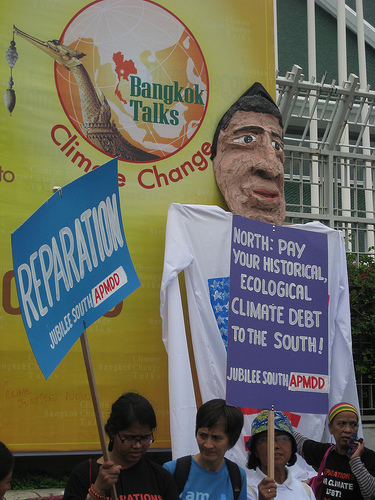Think Climate Finance is boring? Think again.
cross posted from Grist.
Remember when the World Trade Organization, the World Bank, and International Monetary Fund were constantly making global headlines for their fierce opposition from people’s movements around the world? Well, international Finance Institutions (including the World Bank) are rearing their ugly heads again – this time with the U.N. as their vehicle.
Today, more than 50 social movements, trade unions, environmental groups and NGOs from 17 countries issued a statement at the United Nations in Bangkok, where UNFCCC climate negotiations move into their fifth day.
The groups, which include several large international networks, said that rich countries should acknowledge their historical responsibility and the “ecological and climate debts” they owe to developing countries. “Deep, drastic cuts in greenhouse gas emissions, through domestic measures is part of reparations,” the statement said. “They took much more than their fair share of atmospheric space, and in the process denied the people of developing countries – the people of the South – their rightful share. They must give it back.”

And they’re right. As colleagues here in Bangkok talk about their newly-homeless families from the floods earlier this week in the Philippines, it is undeniable that the economic prosperity of the North is the gift-that-keeps-on-giving to the South – this time around in the form of devastating climate change. Tom Pickens from Friends of the Earth described it like having a fancy four course meal in an expensive restaurant – and then forcing someone walking by on the street outside to pay.
Reparations for these debts, according to Fabrina Furtado from Jubilee South, also include the “complete restoration of territories and ecosystems, reconstruction of basic infrastructure, recovery of social rights, and the restoration of the well being of the peoples of the South.”
Reparations must come from public sources.
The groups decried alleged attempts by Annex 1 (Northern) countries to “avoid taking full responsibility” for the consequences of their excessive emissions. In their statement, groups expressed strong opposition to giving any role in climate finance or climate programs to the World Bank, regional development banks and other international financial institutions – and emphasized the need for “a new global fund.”
These views are similar to those of the G77 plus China group, a bloc of more than 130 developing countries in the climate negotiations that considers the World Bank inappropriate for channeling developed countries’ financial obligations under the Convention – largely because of its undemocratic and unaccountable governance structure.
The group’s critique of the World Bank and related financial institutions goes even further. Elena Gerebizza of the Italian NGO Campaign for the Reform of the World Bank said, “The World Bank and other international financial institutions are in large part responsible for the current economic, financial and climate crises. We cannot expect them to play a positive role nor to contribute to real solutions.” “On the contrary,” she added, “these institutions have been pushing false solutions, such as the expansion of the carbon market, which increase financial instability and take away space for serious thinking about real solutions for the climate crisis.”
Whew. United States, ready to listen yet?